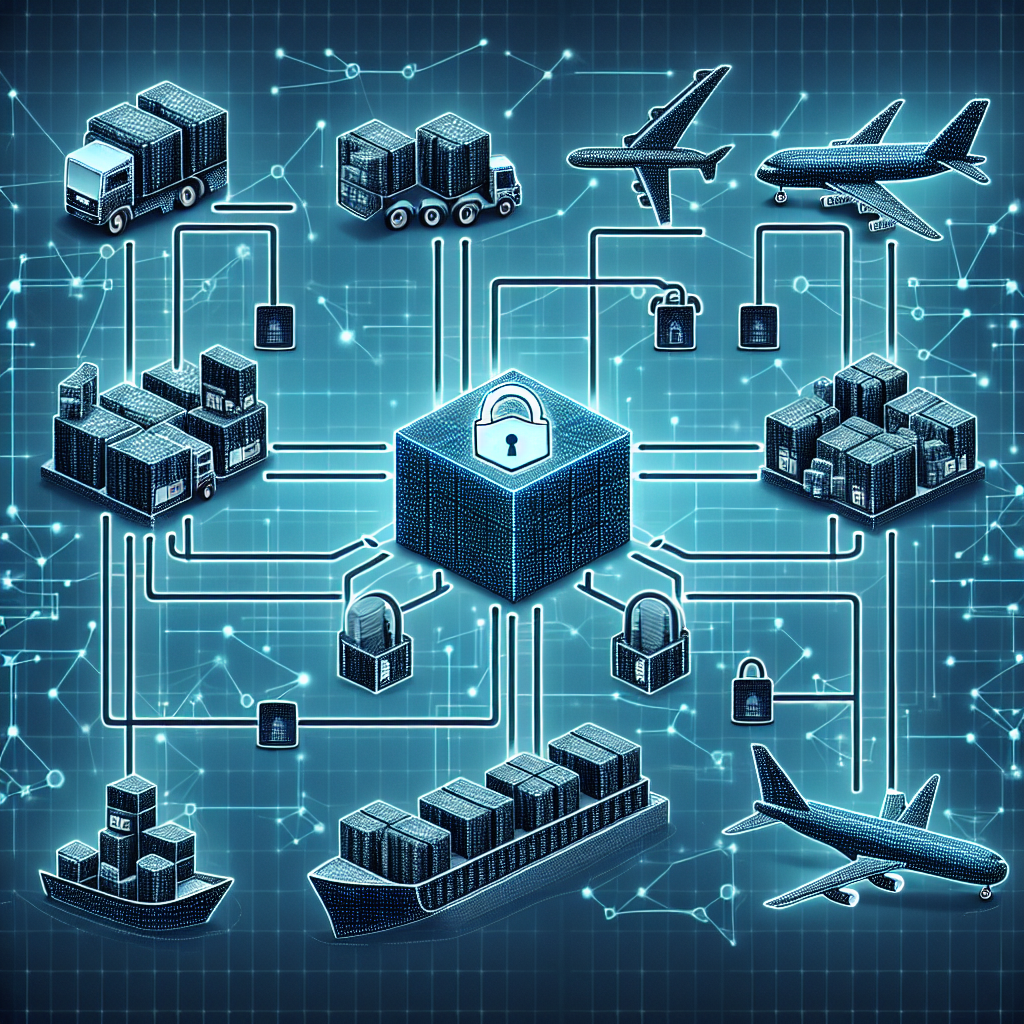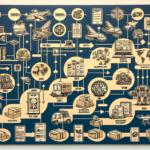-
Table of Contents
“Blockchain: Transforming Supply Chains with Transparency, Efficiency, and Trust.”
Introduction

Blockchain technology is revolutionizing supply chain management by introducing unprecedented levels of transparency, security, and efficiency. Traditionally, supply chains have been plagued by issues such as lack of visibility, fraud, and inefficiencies due to manual processes and disparate systems. Blockchain addresses these challenges by providing a decentralized and immutable ledger that records every transaction across the supply chain in real-time. This ensures that all parties have access to a single, tamper-proof version of the truth, thereby reducing the risk of fraud and errors. Smart contracts automate and streamline processes, reducing the need for intermediaries and speeding up transactions. Additionally, blockchain enhances traceability, allowing companies to track the origin and journey of products with precision, which is crucial for quality control, regulatory compliance, and ethical sourcing. By integrating blockchain into supply chain management, businesses can achieve greater operational efficiency, build trust with consumers, and respond more agilely to market demands.
Enhancing Transparency and Traceability in Supply Chains
Blockchain technology is making waves across various industries, and one of the most significant areas where it is creating a profound impact is supply chain management. The traditional supply chain has long been plagued by issues of transparency and traceability, often leading to inefficiencies, fraud, and a lack of trust among stakeholders. However, blockchain is poised to change all that by offering a decentralized, immutable ledger that can record every transaction and movement of goods in real-time.
To begin with, the transparency that blockchain brings to supply chains is unparalleled. In a conventional supply chain, information is often siloed within different organizations, making it difficult to get a comprehensive view of the entire process. Blockchain, on the other hand, allows all parties involved—from manufacturers to retailers—to access a single, unified source of truth. This shared ledger ensures that everyone has the same information, thereby reducing the chances of discrepancies and misunderstandings. For instance, if a shipment of goods is delayed, all stakeholders can immediately see the reason for the delay and take appropriate action, rather than wasting time trying to track down the information.
Moreover, blockchain enhances traceability, which is crucial for industries like food and pharmaceuticals where the origin and journey of products need to be meticulously tracked. With blockchain, each product can be tagged with a unique identifier that records every step it takes from production to the end consumer. This level of traceability not only helps in ensuring the authenticity of products but also makes it easier to identify and address issues such as contamination or counterfeiting. For example, in the event of a foodborne illness outbreak, blockchain can quickly pinpoint the source of contamination, allowing for swift recalls and minimizing harm to consumers.
In addition to transparency and traceability, blockchain also brings a level of security that is hard to achieve with traditional systems. The decentralized nature of blockchain means that no single entity has control over the entire ledger, making it extremely difficult for bad actors to alter or tamper with the data. Each transaction is encrypted and linked to the previous one, creating a chain of blocks that is virtually tamper-proof. This high level of security is particularly beneficial for industries dealing with high-value goods or sensitive information, as it significantly reduces the risk of fraud and theft.
Furthermore, the implementation of smart contracts on blockchain can automate various processes within the supply chain, thereby increasing efficiency and reducing costs. Smart contracts are self-executing contracts with the terms of the agreement directly written into code. They automatically execute actions when predefined conditions are met, eliminating the need for intermediaries and reducing the chances of human error. For instance, a smart contract could automatically release payment to a supplier once a shipment is confirmed to have arrived at its destination, streamlining the payment process and ensuring timely transactions.
In conclusion, blockchain technology is revolutionizing supply chain management by enhancing transparency, traceability, and security. Its ability to provide a single source of truth, track products in real-time, and automate processes through smart contracts is transforming the way supply chains operate. As more industries begin to adopt blockchain, we can expect to see even greater improvements in efficiency, trust, and overall performance. The future of supply chain management is undoubtedly bright, thanks to the innovative capabilities of blockchain technology.
Reducing Fraud and Counterfeiting with Blockchain Technology
Blockchain technology is making waves across various industries, and one of the most significant areas where it is creating a profound impact is supply chain management. The traditional supply chain has long been plagued by issues of fraud and counterfeiting, which not only result in financial losses but also damage brand reputation and consumer trust. However, blockchain technology is emerging as a powerful tool to combat these challenges, offering a transparent, secure, and immutable ledger that can track products from their origin to the end consumer.
One of the primary ways blockchain reduces fraud and counterfeiting is through its ability to provide an unalterable record of transactions. Each step in the supply chain, from manufacturing to distribution, is recorded on the blockchain, creating a digital trail that is virtually impossible to tamper with. This transparency ensures that all parties involved can verify the authenticity of the products at any point in the supply chain. For instance, a luxury goods manufacturer can use blockchain to certify that their products are genuine, allowing retailers and consumers to verify the product’s authenticity with a simple scan of a QR code.
Moreover, blockchain technology enhances traceability, which is crucial in industries where product integrity is paramount, such as pharmaceuticals and food. In the pharmaceutical industry, counterfeit drugs pose a significant risk to public health. By implementing blockchain, pharmaceutical companies can track each batch of medication from production to the pharmacy shelf. This not only helps in identifying and removing counterfeit drugs from the market but also ensures that any recalls can be executed swiftly and efficiently. Similarly, in the food industry, blockchain can trace the journey of food products from farm to table, ensuring that consumers receive safe and authentic products.
In addition to enhancing transparency and traceability, blockchain also fosters greater accountability among supply chain participants. Each transaction recorded on the blockchain is time-stamped and linked to the previous transaction, creating a chronological chain of events. This level of accountability discourages fraudulent activities, as any attempt to alter the records would be immediately apparent to all parties involved. For example, if a supplier attempts to falsify the quantity or quality of goods delivered, the discrepancy would be evident on the blockchain, allowing for swift corrective action.
Furthermore, blockchain technology can streamline the verification process, reducing the need for intermediaries and manual checks. Traditionally, verifying the authenticity of products involves multiple parties and extensive paperwork, which can be time-consuming and prone to errors. With blockchain, verification can be automated and conducted in real-time, significantly reducing the risk of human error and speeding up the process. This efficiency not only saves time and resources but also enhances the overall reliability of the supply chain.
As blockchain technology continues to evolve, its potential applications in supply chain management are expanding. Companies are increasingly exploring innovative ways to integrate blockchain into their operations, from smart contracts that automate payment processes to decentralized platforms that facilitate direct transactions between suppliers and buyers. These advancements promise to further reduce fraud and counterfeiting, creating a more secure and trustworthy supply chain ecosystem.
In conclusion, blockchain technology is revolutionizing supply chain management by providing a transparent, secure, and immutable record of transactions. Its ability to enhance traceability, foster accountability, and streamline verification processes makes it a powerful tool in the fight against fraud and counterfeiting. As more industries adopt blockchain, we can expect to see a significant reduction in fraudulent activities, leading to safer products and greater consumer trust.
Streamlining Logistics and Inventory Management through Decentralization
Blockchain technology, often associated with cryptocurrencies like Bitcoin, is making waves in various industries, and supply chain management is no exception. The decentralized nature of blockchain offers a new level of transparency, security, and efficiency that traditional systems struggle to match. As companies strive to streamline logistics and inventory management, blockchain emerges as a game-changer, promising to revolutionize the way goods are tracked and managed from production to delivery.
One of the most significant advantages of blockchain in supply chain management is its ability to provide an immutable and transparent ledger. Every transaction or movement of goods is recorded in a block, which is then linked to the previous block, creating a chain of records that is virtually tamper-proof. This transparency ensures that all parties involved in the supply chain, from manufacturers to retailers, have access to the same information. Consequently, it becomes easier to track the origin of products, verify their authenticity, and ensure compliance with regulations.
Moreover, blockchain’s decentralized nature eliminates the need for a central authority to validate transactions. This decentralization reduces the risk of fraud and errors, as every participant in the network has a copy of the ledger and can verify the transactions independently. For instance, in the case of a product recall, companies can quickly trace the affected items back to their source, minimizing the impact on consumers and the business. This level of traceability is particularly crucial in industries like pharmaceuticals and food, where the safety and quality of products are paramount.
In addition to enhancing transparency and security, blockchain also streamlines logistics by automating various processes through smart contracts. These self-executing contracts, with the terms of the agreement directly written into code, automatically trigger actions when predefined conditions are met. For example, a smart contract can automatically release payment to a supplier once the goods are delivered and verified. This automation reduces the need for intermediaries, speeds up transactions, and lowers operational costs.
Furthermore, blockchain can significantly improve inventory management by providing real-time visibility into stock levels. Traditional inventory systems often suffer from delays and inaccuracies due to manual data entry and siloed information. In contrast, a blockchain-based system offers a single, unified view of inventory across the entire supply chain. This real-time data allows companies to optimize their stock levels, reduce excess inventory, and prevent stockouts. As a result, businesses can respond more swiftly to changes in demand and improve overall efficiency.
Another compelling aspect of blockchain in supply chain management is its potential to foster greater collaboration among stakeholders. By providing a shared, transparent platform, blockchain encourages trust and cooperation between different parties. For example, suppliers, manufacturers, and retailers can work together more effectively to forecast demand, plan production, and manage logistics. This collaborative approach not only enhances efficiency but also strengthens relationships and drives innovation.
While the benefits of blockchain in supply chain management are clear, it is essential to acknowledge the challenges that come with its implementation. Integrating blockchain with existing systems requires significant investment in technology and training. Additionally, the success of a blockchain-based supply chain depends on the participation and cooperation of all stakeholders. Despite these hurdles, the potential rewards make it a worthwhile endeavor for forward-thinking companies.
In conclusion, blockchain technology holds the promise of transforming supply chain management by enhancing transparency, security, and efficiency. Through its decentralized ledger, smart contracts, and real-time data capabilities, blockchain streamlines logistics and inventory management, paving the way for a more responsive and resilient supply chain. As more companies recognize the value of this innovative technology, blockchain is set to become an integral part of the future of supply chain management.
Conclusion
Blockchain is revolutionizing supply chain management by providing enhanced transparency, traceability, and security. It enables real-time tracking of goods, reduces fraud, and ensures the authenticity of products. Smart contracts automate and streamline processes, reducing administrative costs and errors. By fostering trust among stakeholders and improving data integrity, blockchain technology significantly enhances the efficiency and reliability of supply chain operations.





